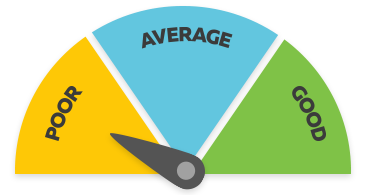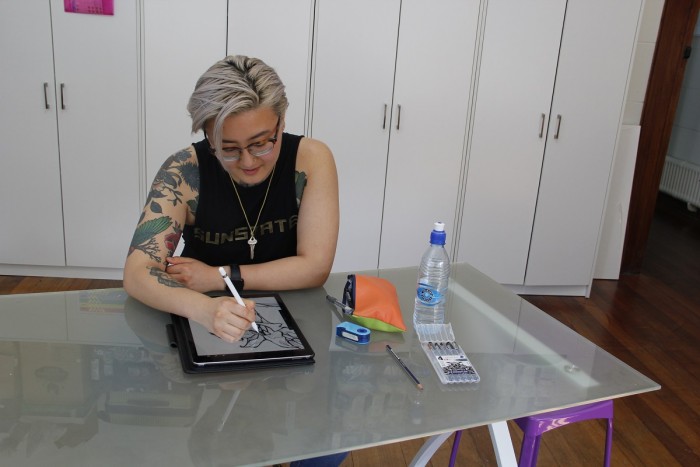Tattoo Artist
Ringa Kirituhi
Alternative titles for this job
Tattoo artists use sterilised skin-piercing equipment and ink or jewellery to decorate people's skin.
Pay
Pay rates for tattoo artists vary depending on skill, experience and demand.
Source: careers.govt.nz research, 2018.
Job opportunities
Pay
Pay rates for tattoo artists vary depending on how skilled and experienced they are, and how much demand there is for their work.
- At first, tattoo artists may work in informal apprenticeships in studios, often unpaid, to learn their trade.
- Tattoo artists in informal apprenticeships, tattooing clients under supervision, may earn minimum training wage.
- Most tattoo artists are self-employed, so their pay rates depend on their skill and popularity, and the success of their business.
A quarter of tattoo artists work part-time and may rely on supplementary jobs to make a living.
Source: careers.govt.nz research, 2018.
(This information is a guide only. Find out more about the sources of our pay information)
What you will do
Tattoo artists may do some or all of the following:
- explain tattooing and piercing procedures to clients
- help clients choose images or jewellery
- copy or design images for clients
- make stencils of images
- prepare and sterilise skin
- use inked needles or traditional tools to create decorative, cosmetic or paramedical (covering scars or buns) tattoos
- pierce or cut skin and insert jewellery
- sterilise equipment and make sure their studio meets health and safety standards.
Skills and knowledge
Tattoo artists need to have :
- drawing skills and the ability to create different artistic styles
- skill in using tattooing or piercing equipment
- knowledge of human anatomy and how to prevent, recognise and treat infections
- knowledge of disinfectants, health and safety, and hygiene
- first aid skills.
Self-employed body artists also need business management skills.
Working conditions
Tattoo artists usually:
- work varied hours, including late nights and weekends
- work in tattoo studios, beauty salons and cosmetic clinics
- work in conditions where they may be exposed to blood and infections.
What's the job really like?

Rose Hu
Tattoo Artist Apprentice
The pathway to an art job
"I did a Bachelor of Engineering and worked in engineering – but I didn’t like it. Then I worked in the tech sector – and realised it was art that makes me happy.
"I left my job to do art. I got a front-of-house [hospitality] job to pay the bills and then I saw the advert for the tattoo apprenticeship."
Long hours of training
"Tattoo apprenticeships are unlikely to be paid and most studios make you pay for your own equipment. To practise, you need to buy practice skins or tattoo yourself or a willing friend.
"At the start I did three days working in a restaurant for money and four days at the tattoo apprenticeship. I hung out with friends a lot less and had to get quite organised. I had five months of doing seven days a week.
"Now I have four days making enough money from tattooing, and one day working as a waitress."
Creative job fulfilment
"It’s a very fulfilling job – despite being much harder than my previous jobs. Every step of the way you're responsible for everything, and there's always that pressure of knowing that what you’re doing is essentially final.
"Creativity is what I wanted, and every day you create something for someone. You finish the tattoo and they smile and look so pleased they got it."
Entry requirements
There are no specific requirements to become a tattoo artist.
Tattoo artists are usually trained in an informal, often unpaid, apprenticeship by experienced tattoo artists or body piercers.
Art courses are useful for tattoo artists. Small business courses are useful for tattoo artists who want to run their own business.
Secondary education
No specific secondary education is required for this job. However, painting, sculpture, photography, printmaking (combined), maths, te reo Māori, design and visual communication, and health to at least NCEA Level 1 are useful.
Additional requirements for specialist roles:
Cosmetic Tattooist/Permanent Make-up Artist or Paramedical Tattooist
To become a cosmetic tattooist/permanent make-up artist or paramedical tattooist, you can complete a course, such as a certificate in cosmetic tattooing, at a private academy.
Personal requirements
Tattoo artists need to be:
- creative and artistic
- patient and confident
- responsible
- able to handle criticism
- calm
- good at listening and communicating with people
Tattoo artists should not be squeamish.
A key skill is communication. You do have to really understand what the client wants – the tattoo is on them forever.

Rose Hu
Tattoo Artist Apprentice
Useful experience
Useful experience for tattoo artists includes:
- work in visual arts
- hands-on arts and crafts jobs
- work in beauty, healthcare, retail or customer services.
Physical requirements
Tattoo artists need good hand-eye co-ordination and good physical and mental stamina, as they need to concentrate for long periods.
Find out more about training
- Association of Professional Piercers Ltd
- info@safepiercing.org - www.safepiercing.org
What are the chances of getting a job?
Few opportunities for tattoo artists
It is difficult to find work as a tattoo artist due to the small size of the occupation, and low staff turnover.
Few tattoo artist jobs advertised
Demand for tattoo artists is low because the occupation is small, with low staff turnover.
There are already enough tattoo artists to meet the growing demand for tattoos and piercings.
Your chances of securing work as a tattoo artist are best if you:
- have experience
- have a good reputation
- promote yourself on social media.
Limited number of apprenticeships available for tattoo artists
There are limited opportunities for apprenticeships for tattoo artists. You can improve your chances of getting an apprenticeship by approaching studios directly once you:
- have a portfolio of your own designs in many different styles
- have your own website and social media presence
- have developed other skills such as hygiene knowledge and marketing.
Self-employment common among tattoo artists
Two-thirds of all tattoo artists are self-employed. A quarter of tattoo artists work part time.
According to the Census, 423 tattoo artists worked in New Zealand in 2018.
Self-employment common among tattoo artists
Two-thirds of tattoo artists are self-employed. A quarter of tattoo artists work part time.
Sources
- Ministry of Business, Innovation and Employment, '2006-2014 Occupation Data' (prepared for Careers New Zealand), 2015.
- Nichol, T, 'How Getting a Tattoo Became so Mainstream', 21 January 2017, (www.nzherald.co.nz).
- Pudney, H, 'Kiwi Tattoo Artists Say Scar Cover-ups Are a Way to Move On', 15 January 2017, (www.stuff.co.nz).
- Stats NZ, '2018 Census Data', 2019.
- Twisted Thread, 'Becoming a Tattooist: The Hidden Journey', 7 November 2017, (twistedthread.co.nz).
- Zealand Tattoo, 'Māori Tattoo: The Definitive Guide to Ta Moko', accessed October 2018, (www.zealandtattoo.co.nz).
(This information is a guide only. Find out more about the sources of our job opportunities information)
Progression and specialisations
Experienced tattoo artists may progress to set up their own tattoo business.
Tattoo artists may specialise in tattooing or body piercing, or in the following roles:
- Cosmetic Tattooist/Permanent Make-up Artist
- Cosmetic tattooists/permanent make-up artists apply tattoo make-up, such as lipliner and eyeliner.
- Paramedical Tattooist
- Paramedical tattooists apply tattoos to people who have had accidents, operations or illnesses. For example, they may tattoo eyebrows for someone who has lost their hair.
Last updated 14 November 2024


